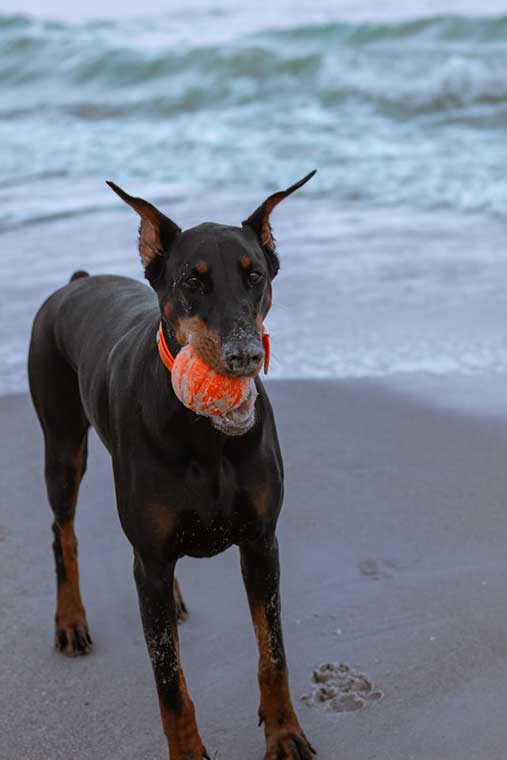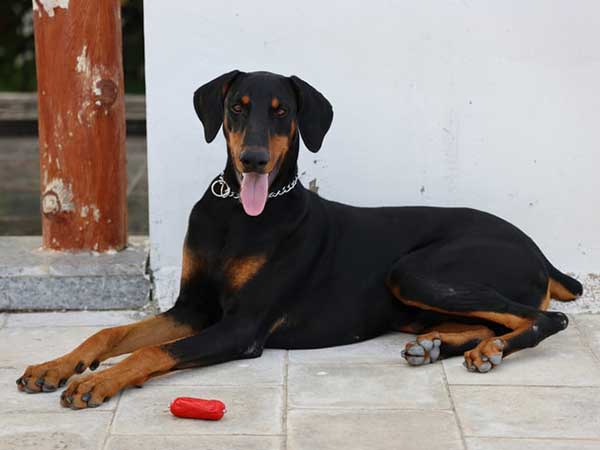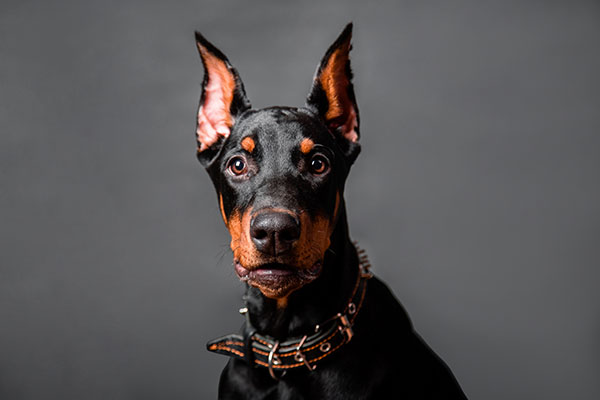The Dobermann, also known as Doberman Pinscher, is one of the world’s most iconic dog breeds. Originally developed around the 1880s, this breed is famous for his exceptional physical stamina, incredible intelligence, and remarkable sociability.
But if you’re planning to bring another dog into a family with a resident Doberman, it’s natural to wonder whether the two canines will get along.
The good news is that Dobermanns make fantastic family pets. These dogs will coexist harmoniously with your kids, other dogs, and virtually all members of the household.
However, as with any dog breed, the ease with which Doberman Pinschers get along with fellow dogs depends on certain factors.
We’ve prepared an insightful guide to the relationship between Dobermanns and other dogs. We’ll begin by familiarizing ourselves with this dog breed, including how it came about and some of its core physical and personality attributes. Thereafter, we’ll shed more light on the likely interactions between Dobermann pinschers and other dogs.
Dobermann Quick Facts
| Official Name: | Dobermann |
| Other Names: | Dobermann Pinscher |
| Common Nicknames: | Dobie and Dobermann |
| Period Developed: | Around the 1880s |
| Developers: | Karl Friedrich Louis Dobermann and Otto Goeller |
| Size: | 27 to 28 inches or 68 to 72 cm for dogs and 25 to 27 inches or 63 to 68 cm for bitches |
| Weight: | 88 to 99 pounds or 40 to 45 kg for dogs and 71 to 77 pounds or 32 to 35 kg for bitches |
| Color: | Black & tan and red & tan |
| Coat Characteristics: | Short fur |
| General Physical Characteristics: | Graceful gait and long muzzle |
| Temperament and Personality: | Intelligent, alert, obedient, and people-oriented |
| Common Health Conditions: | Dilated cardiomyopathy (DCM), von Willebrand’s disease, cervical vertebral instability (CVI), prostatic disease, hip dysplasia, hypothyroidism, and canine compulsive disorder |
| Average Lifespan: | 10 to 13 years |
| Year Registered by the American Kennel Club (AKC): | 1908 |

Where Did Dobermanns Come From?
Dobermanns have one of the most fascinating histories of all dog breeds. The breed traces his origin back to the 1880, and is considered the brainchild of German tax collector Karl Friedrich Louis Dobermann.
Karl Dobermann operated a dog pound in Apolda, Thuringia, Germany, around the same period he developed the Doberman dog breed.
He desired to create a breed that would offer him maximum protection as he went about his tax collecting enterprise. To qualify for the protection role, the new breed would possess impressive strength and stamina, as well as intelligence and sociability.
Karl assembled several dog breeds that possessed most of the desired qualities. It’s unclear which specific breeds he went for or the ratios in which he mixed them. Some experts opine that he must have used the German Pinscher, Beauceron, Weimaraner, and Rottweiler. Regardless of the breeds Karl mixed, one thing is for sure. By the end of this ambitious exercise, the prolific breeder gave the world a distinct dog breed.
When Karl Dobermann died in 1894, German dog fanciers paid tribute to him by naming his breed the Dobermann-pinscher.
Several years later, the word ‘pinscher’ was dropped. That’s because the term is German for ‘terrier,’ and the Dobermann is not technically a terrier. The ‘pinscher’ reference is no longer used in many countries, with only the United States and Canada retaining it.
Five years after Karl Dobermann’s death, another breeder named Otto Goeller founded the National Doberman Pinscher Club. This organization is credited with perfecting the Dobermann breed. The breed was eventually registered by the AKC in 1908.

Doberman’s Physical Characteristics
The Doberman is a medium-large dog breed. Males measure 27 to 28 inches at the withers and weigh 88 to 99 pounds, whereas females measure 25 to 27 inches and weigh 71 to 77 pounds.
Dobermans sport a strong and muscular body. However, these dogs have an incredibly graceful gait.
Doberman muzzles are reasonably longer than that of many dogs. Their ears are traditionally cropped and their tails are usually docked.
In terms of color, Dobermans predominantly exist in two different colors – black & tan and red & tan. However, the breed may sport shades of many colors, including black, blue, fawn, and red.
White Dobermans also exist. However, the white color isn’t recognized by professional breeders. The color is widely considered a genetic abnormality due to the high prevalence of congenital health problems among white Dobermans, including auditory issues, vision problems, cancers, and behavioral issues.
There have been previous attempts to eradicate white-colored Dobermans through inbreeding. Unfortunately, these endeavors haven’t borne meaningful fruits.
Do Dobermans Get Along With Other Dogs?
To answer this question conclusively, we must begin by assessing the Doberman’s personality and temperament, while also comparing those aspects with the dog’s physical attributes. And a great place to start is by establishing the Dobermann’s intelligence levels.
As already hinted earlier on, the Doberman is an incredibly intelligent dog breed. These dogs are capable of remembering sights and sounds from months back. The Dobermann has scored remarkably better than many dog breeds across various intelligence parameters, including ease of learning, problem-solving, memory, communication, and trainability.
High intelligence underscores the primary reason behind the breed’s development. As the Dobermann was created to offer protection, it was necessary for the dog to differentiate family and well-meaning guests from strangers and potential threats.
Based on intelligence, it’s evident that the Doberman can get along with other dogs. The dog is smart enough to remember the faces and scents of his fellow canine housemates. He’s also intelligent enough to avoid getting into confrontations with other dogs, especially if he understands that doing so may put him at a disadvantage.
Thanks to their remarkable intelligence, Dobermans have mastered a way of coexisting harmoniously with any dog breed, particularly larger and more domineering breeds like the German Shepherds and Great Danes.
Are Dobermans Aggressive With Other Dogs?
We’ve just mentioned that the Doberman is smart enough to remember the faces and smells of fellow dogs in his pack. This level of intelligence can help a Dobermann to establish his rank within the family hierarchy, thereby averting undue confrontations.
However, intelligence doesn’t always reflect on a dog’s aggression levels. So, can Dobermans be around other dogs without becoming overly aggressive?
Let’s take a few steps back and recall that the Doberman was developed for guarding purposes. Therefore, it’s understandable why the breed possesses a degree of physical stamina, athleticism, and intimidation.
Due to his intimidating physique, the Dobermann has been widely stereotyped as being fierce and aggressive. Nothing can be further from the truth.
It’s true that the Doberman possesses fearless and intimidating tendencies. The dog is readily given to defending his owner, especially from other guard dogs. However, the Doberman is also surprisingly obedient and eager to please. The dog generally doesn’t display aggressive tendencies unless he genuinely feels threatened. He’s also extremely loyal and will exercise restraint when commanded to do so.
Can Dobermans Be Aggressive In Certain Circumstances?
Absolutely. Although the Doberman is generally calm and friendly, the dog can become fiercely aggressive if the situation calls for it.
First off, your usually even-tempered Doberman may become aggressive if he feels threatened. The threat could come from strangers or other strange pets in the neighborhood.
Rivalries with fellow household dogs might also trigger aggression. This is actually the most common cause of squabbles among Dobermanns. That’s because there’s a high number of things to compete over, ranging from food to toys, mates, and even their owner’s attention.
Aggression patterns may also differ from time to time depending on your Dobermann’s sex. Unneutered male Dobermanns may squabble over bitches while female Dobermanns may become disproportionately aggressive while nursing.
That begs the question, are female Dobermans good with other dogs?
Female Dobermans are generally good with other dogs. But like most animals, a female Doberman will exhibit aggression while nursing her pups. This form of aggression has a lot to do with a mother’s guarding instincts.
Still on gender relations, it’s also generally observed that pets coexist more harmoniously with members of the opposite than the same sex. So, a male-female Doberman pair will definitely live more peacefully than a male-male or female-female pair.
In a nutshell, the Doberman is generally a calm and even-tempered breed unless provoked. Unprovoked aggression is rare but could still occur due to past experiences or inadequate training and socialization.
Do Dobermans Get Along With Small Dogs?
Having already mentioned that the Doberman is good with other dogs, you could now be considering bringing a smaller dog breed to live with your resident Doberman. But before you do, it would help to understand how Dobermans generally relate with smaller dogs.
So, are Dobermans good with small dogs?
Dobermans aren’t known to attack small dogs or smaller dog breeds unprovoked. However, these dogs possess a strong instinct of chasing smaller pets. This can be a big problem, especially if the other pet misinterprets the Doberman’s intentions.
If you’re planning to get your Doberman a companion, it’s best to avoid smaller dog breeds like terriers and the Chihuahuas. Insist on larger or medium-sized dog breeds, preferably other Dobermans.
Can You Train Your Doberman To Be Less Aggressive?
Dobermans are typically calm and mellow. But on the off-chance that you’re living with an aggressive Doberman, do not despair.
Like any dog, it’s possible to stop or redirect Doberman aggression through training. It’s even easier to train Dobermans, considering how intelligent these dogs are.
First, you’ll need to determine whether your Doberman exhibits provoked or unprovoked aggression.
Provoked aggression is quite normal and the best solution would be to address the underlying triggers. For instance, if your Doberman is continuously being pestered by another household pet, you might consider rehoming the aggressor.
In the case of unprovoked aggression, you can adopt any form of obedience command training. Ideally, these are trainings that aim at stopping unwarranted aggression by teaching the dog certain commands associated with calmness.
Since unprovoked aggression may be more of a psychological than environmental response, it would help to seek out the professional assistance of an in-person trainer. The trainer can leverage their experience to help you identify the triggers and develop a robust training schedule for your Doberman.
Other Ways to Make Your Doberman Less Aggressive
Training alone may not help to put your Doberman’s aggression in check. You should also consider early socialization.
Like most dogs, the Doberman should be socialized as soon as he’s weaned (typically between 3 and 4 weeks after birth).
Early socialization allows dogs to observe and learn the behaviors of their owners and other pets around them. Your Doberman will become adept at reading body language and interpreting social cues, two aspects that are crucial in helping dogs interact appropriately. The dog will also develop skills in distinguishing between threatening and non-threatening behaviors.
One way to socialize your Doberman is to invite your friends or relatives on shared dog walks. Gradually allow the dog to interact freely with the ‘strangers’ until he can comfortably hang around them.
The following are additional tips to deal with aggressive Dobermans;
- Get dogs of the opposite sex.
- If you must keep Dobermans of the same sex in the same household, ensure they’re both neutered or spayed.
- Get your Doberman a larger or medium-sized companion.
- Keep Dobermans of different ages.
- Separate feeding times to minimize food aggression.
- Address toy and territorial aggression by ensuring each dog has enough toys and his own playing patch.
- Exercise your Dobermans thoroughly to release their pent-up energies.
- Show equal attention to all your Dobermans to guard against jealous confrontations.
- Supervise your Dobermans at all time.
So, Can Dobermans Live With Other Dogs?
Dobermans can live harmoniously with other dogs. Despite their rather intimidating physique, the Doberman is not an aggressive breed.
However, all dogs are unique and there’s a likelihood that your Doberman may exhibit aggression from time to time. Fortunately, there are numerous ways to calm down an aggressive Doberman.
It’s also important to note that certain trigger factors may cause a usually calm Doberman to become suddenly aggressive. Examples include stress, boredom, old age, and some underlying medical conditions.
This underscores the significance of taking your Doberman for professional checkups regularly. Routine examinations can uncover potential medical or behavioral issues that could affect your Doberman’s temperament and have these problems fixed early enough.
Checkout Our Favorite Dog Products
1. BEST PUPPY TOY
We Like: Snuggle Behavior Toy with Heart Beat & Heat Pack – Ideal toy for new puppies.
2. BEST DOG TRAINING PROGRAM
We Like: Doggy Dan The Online Dog Trainer – Stop any dog problem and raise the perfect puppy with The Online Dog Trainer.
3. BEST DOG PUZZLE TOY
We Like: Outward Hound Interactive Puzzle Toy – Every dog loves chasing squirrels at the park. The Outward Hound Hide-a-Squirrel Puzzle Toy gives your dog the same feeling as though he was outdoors chasing live squirrels.
4. Best Bone Broth for Dogs
We Like: (Solid Gold – Human Grade Bone Broth for Dogs) – Simmered Beef Bone Broth With Turmeric Provides A Nutrient-Dense And Flavorful Addition To Your Dog’s Meal + Rich In Natural Collagen From Beef Bones.
5. Best Multivitamin for Dogs
We Like: PetHonesty 10-For-1 Multivitamin – 10 Benefits in 1 Daily Treat – These Multivitamin Snacks combine a well-rounded blend of the most essential vitamins and supplements including glucosamine, probiotics, vitamins and omegas, for dogs’ overall daily health.



